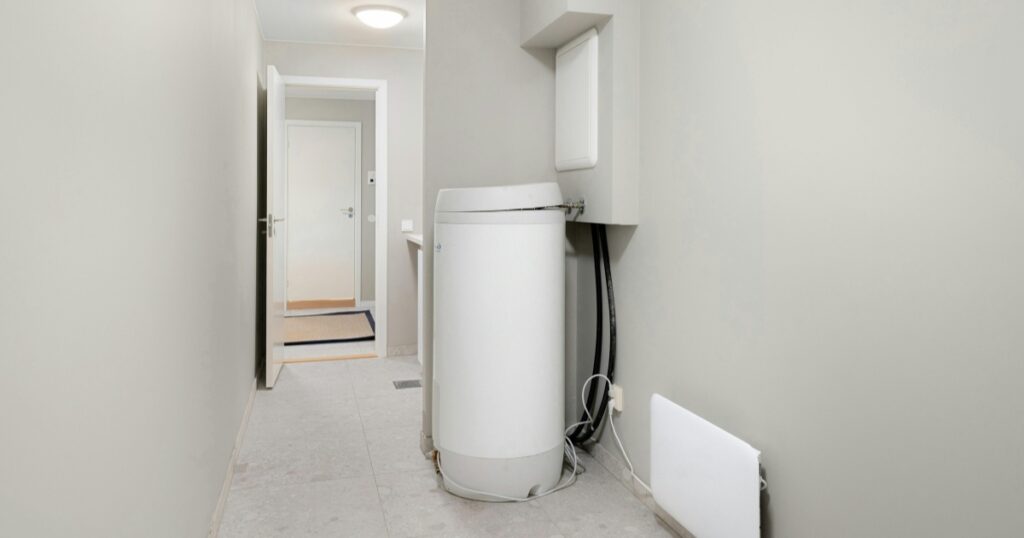Are you finding that your showers aren’t as hot as they used to be? Or maybe you’ve noticed some odd noises coming from your water heater? We understand how frustrating that can be.
The issue could well be due to the build-up of sediment in your hot water system – a problem we’re all too familiar with down here in Australia. This article delves into the nitty-gritty of this often overlooked yet common hindrance, explaining how it can compromise efficiency, hike up repair costs and send energy bills through the roof.
Key Takeaways
- Sediment buildup in hot water systems can lead to decreased efficiency and increased energy consumption.
- It can cause issues like lack of hot water, strange noises, leaks, and higher utility bills.
- Regular maintenance, including flushing out sediment buildup, is crucial for preventing damage and costly repairs to your water heater.
- Hiring a professional for hot water system repair ensures expert knowledge and efficient solutions.
Understanding Sediment Buildup in Water Heaters
Sediment buildup in water heaters is a common issue that occurs when particles, such as minerals and debris, settle at the bottom of the tank.
What is sediment buildup in water heaters?
Sediment buildup in water heaters is a common issue that results from the accumulation of minerals, sand, and other debris in your hot water tank. These substances usually come from the hard water supply commonly found in many homes.
Over time, they settle at the bottom of your heater unit and start to accumulate. This process can slow down heat transfer leading to overheating and eventual warping or cracking of your system’s metal components – known as sediment clogging.
If not addressed promptly, it could lead to more serious issues such as permanent damage to your water heater which can eventually require costly repairs or replacements.
How does it occur?
Sediment buildup in a hot water system occurs when minerals and other materials settle at the bottom of the water heater tank over time. These particles can come from various sources, including the water supply itself or the degradation of internal components within the tank.
As hot water is being used, these sediments are carried along with it and eventually settle at the bottom of the tank. If not addressed, sediment accumulation can cause clogging, reduced efficiency, and potential damage to important components of the water heater.
Regular maintenance and flushing of the system are crucial to prevent sediment buildup and ensure optimal performance.
The Effects of Sediment Buildup on Water Heaters
Sediment buildup in water heaters leads to decreased efficiency, increased energy consumption, and the risk of damage to the water heater itself.
Decreased efficiency
Sediment buildup in your hot water system can lead to decreased efficiency.

When sediment accumulates in the tank, it creates a barrier between the heating element and the water, making it harder for the heat to transfer.
This means that your water heater has to work longer and harder to heat up the water, resulting in reduced performance and increased energy consumption. As a result, you may experience a decrease in hot water supply and higher utility bills.
Regular maintenance and flushing of your water heater can help prevent sediment buildup and keep your system running efficiently.
Increased energy consumption
Sediment buildup in your hot water system can lead to increased energy consumption. As sediment accumulates in the tank, it coats the heating element and reduces its efficiency. This means that your water heater has to work harder and use more energy to heat up the water.
Consequently, you may notice a significant increase in your utility bills over time. To prevent this from happening, regular maintenance and flushing of your water heater are essential.
By removing sediment buildup, you can ensure that your hot water system operates efficiently, saving both energy and money.
Risk of damage to the water heater
Sediment buildup in your water heater can pose a risk of damaging the system. The accumulated sediment can cause issues like metal warping and deformation of the water heater components, which may lead to leaks and odd noises.
Over time, this can result in frequent repairs and decreased performance. Additionally, if sediment clogs up the heating element, it can overheat and cause further damage. It is important to address sediment buildup promptly to prevent costly repairs and ensure the longevity of your water heater.
Regular maintenance, including flushing out the sediment, will help keep your system running smoothly.
Water quality issues
Sediment buildup in your hot water system can lead to various water quality issues. Over time, the accumulated sediment can cause changes in the colour, smell, taste, and texture of your water.
You may notice discolouration or a strange odour coming from your taps. The water might also have an altered taste or feel different when you use it. These changes are indicators that sediment has built up in your hot water tank and is affecting the overall quality of your water supply.
It’s important to address this issue promptly to avoid further damage to your hot water system.
Signs of Sediment Buildup in Water Heaters
Lack of hot water, strange noises, leaks, and increased utility bills are all signs that your water heater may have sediment buildup. If you want to avoid costly repairs and ensure a reliable supply of hot water, read on to learn more about the impact of sediment buildup on your hot water system.
Lack of hot water
If you’re experiencing a lack of hot water in your home, it could be due to sediment buildup in your hot water system. Sediment materials like mineral deposits and rust can accumulate over time, blocking the flow of hot water and reducing the efficiency of your system.
This means you might not get enough hot water for your daily needs. When sediment builds up, it’s important to take action promptly to prevent further damage to your water heater. Regular maintenance and flushing of the tank can help remove sediment and ensure a steady supply of hot water throughout your home.
Strange noises
If you start hearing strange noises coming from your hot water system, it could be a sign of sediment buildup. As sediment accumulates in the tank, it can cause shifting and clanking sounds as the water heater heats up.
These noises can be quite noticeable and may indicate that the sediment has become a problem for your system. Ignoring these sounds can lead to further issues like leaking or even damage to the components of your water heater.
If you hear strange noises coming from your hot water system, it’s essential to address the issue promptly to prevent any further damage or repair needs.
Leaks
If you notice leaks coming from your hot water system, it could be a sign of sediment buildup. Sediment can damage the internal components of the water heater, causing cracks and corrosion that lead to leaks.
These leaks not only waste water but can also damage surrounding areas, leading to costly repairs. It is important to address leaks promptly by contacting a professional hot water system repair service, like Above + Beyond Service Company, who can diagnose the issue and provide effective solutions.
Don’t let leaks go unchecked – take action to prevent further damage and ensure your hot water system operates smoothly.
Increased utility bills
The presence of sediment buildup in your hot water system could be causing an unexpected increase in your utility bills. When sediment accumulates in the tank, it can hinder the efficiency of your water heater, causing it to work harder and consume more energy.
As a result, you may notice a spike in your monthly utility costs. By addressing sediment buildup through regular maintenance and flushing, you can help restore your water heater’s efficiency and keep those utility bills under control.

Importance of Regular Water Heater Maintenance
Regular water heater maintenance is crucial in preventing sediment buildup and ensuring optimal performance.
Flushing out sediment buildup
Regularly flushing out sediment buildup from your hot water system is crucial for maintaining its efficiency and performance.
Over time, mineral deposits and rust can accumulate in the tank, blocking water flow and reducing effectiveness.
By removing this sediment, you not only ensure a steady supply of hot water but also prevent damage to the system’s components. Flushing the tank helps eliminate any clogs that may hinder efficient heating, resulting in lower energy consumption and decreased utility bills.
Don’t overlook this simple maintenance task – keep your hot water system running smoothly by regularly flushing out sediment buildup.
Preventing future repairs
To prevent future repairs to your hot water system, it is crucial to take proactive steps to maintain its condition. Regular maintenance and flushing of the water heater can help remove sediment buildup that could potentially lead to damage and costly repairs down the line.
By addressing sediment accumulation promptly, you can ensure that your hot water system operates efficiently and provides a consistent supply of hot water without any disruptions. Preventative measures such as cleaning the water tank and implementing proper sediment removal techniques can go a long way in extending the lifespan of your system and avoiding unnecessary expenses.
Professional Water Heater Repair Services
Benefits of hiring a professional for your hot water system repair needs include expert knowledge and experience, ensuring the job is done correctly and efficiently.
Benefits of hiring a professional
Hiring a professional for your hot water system repair comes with several benefits. First and foremost, professionals have the expertise and experience to accurately diagnose and address sediment buildup issues in your water heater.
They can efficiently flush out the sediment, ensuring that your system operates at its optimal efficiency. Additionally, professionals can identify any underlying problems that may be causing the sediment buildup, preventing future repairs or damage to your water heater.
By entrusting the job to a professional, you can have peace of mind knowing that your hot water system will be in safe hands and that you’ll receive quality service from start to finish.
Choose Above + Beyond Service Company for expert hot water system repair
If you’re in need of hot water system repair, look no further than Above + Beyond Service Company. Our team of experts specialises in handling all types of repairs for hot water systems.
Whether it’s a sediment buildup issue or any other problem affecting your water heater, we have the knowledge and skills to get your system up and running efficiently again. With our professional service, you can trust that your hot water needs will be met promptly and effectively.
Don’t settle for less when it comes to repairing your hot water system – choose Above + Beyond Service Company for expert assistance.
Know the Impacts of Sediment Buildup
In conclusion, sediment buildup in hot water systems can have a significant impact on the efficiency and performance of the system. It can lead to decreased hot water supply, increased energy consumption, and potential damage to the water heater.
Regular maintenance and flushing of the system are crucial for preventing sediment accumulation and ensuring optimal functioning of the hot water system. So don’t neglect this important aspect of your home’s plumbing maintenance!






